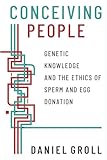Conceiving people : genetic knowledge and the ethics of sperm and egg donation / Daniel Groll.
Publisher: New York, NY : Oxford University Press, [2021]Copyright date: ©2021Description: xii, 240 pages ; 25 cmContent type:- text
- unmediated
- volume
- 9780190063054
- 019006305X
Includes bibliographical references (pages 221-231) and index.
Introduction: The central question -- Keeping secrets -- The significant interest view -- The value of genetic knowledge -- The bionormative prejudice -- Tipping the scale -- The donor's responsibilities -- Policy and practice.
"Each year, tens of thousands of children are conceived with donated gametes (sperm or eggs). By some estimates, there are over one million donor-conceived people in the United States and, of course, many more the world over. Some know they are donor-conceived. Some do not. Some know the identity of their donors. Others never will. Questions about what donor-conceived people should know about their genetic progenitors are hugely significant for literally millions of people, including donor-conceived people, their parents, and donors. But the practice of gamete donation also provides a vivid occasion for thinking about questions that matter to everyone. What is the value of knowing who your genetic progenitors are? How are our identities bound up with knowing where we come from? What obligations do parents have to their children? And what makes someone a parent in the first place? In Conceiving People: Identity, Genetics and Gamete Donation, Daniel Groll argues that people who plan to create a child with donated gametes should choose a donor whose identity will be made available to the resulting child. This is not, Groll argues, because having genetic knowledge is fundamentally important. Rather, it is because donor-conceived people are likely to develop a significant interest in having genetic knowledge and parents must help satisfy their children's significant interests. In other words, because a donor-conceived person is likely to care about having genetic knowledge, their parents should care too."-- Publisher's description.
There are no comments on this title.
